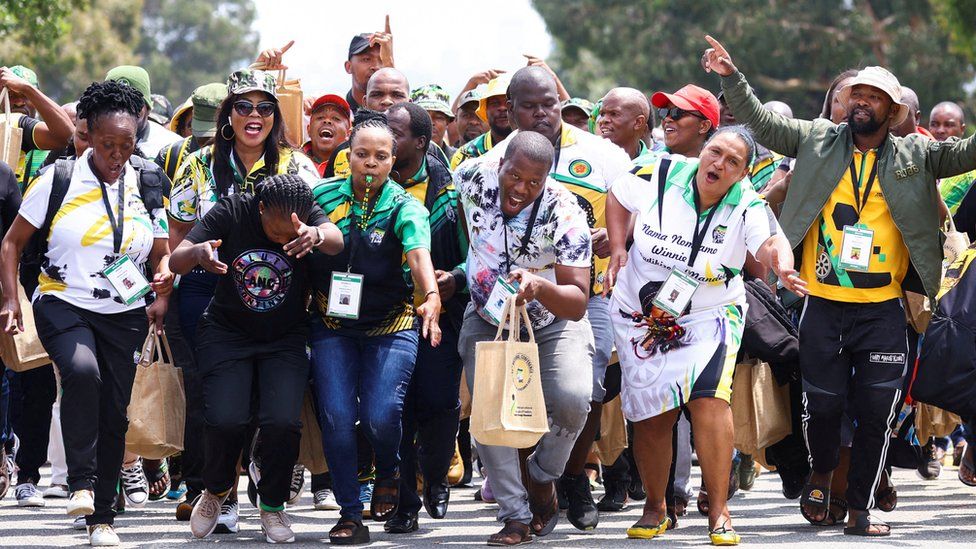Russia says it will deploy musicians and singers to the front lines of its war in Ukraine to boost troops’ morale.
The defence ministry announced the formation of the “front-line creative brigade” this week, saying it would also include circus performers.
The UK’s Ministry of Defence highlighted the brigade’s creation in an intelligence update on Sunday.
Meanwhile, Russian Defence Minister Sergei Shoigu visited frontline troops in Ukraine, Moscow said.
In a statement posted to Telegram, the defence ministry said Mr Shoigu “flew around the areas of deployment of troops and checked the advanced positions of Russian units in the zone of the special military operation”, referring to Moscow’s full-scale invasion of Ukraine launched on 24 February.
The ministry added that he “spoke with troops on the front line” and at a “command post” – but the BBC cannot confirm when the visit took place or whether Mr Shoigu visited Ukraine itself.
Commenting on Mr Shoigu’s reported visit, Ukraine’s military spokesman Serhiy Cherevatyi told Ukrainian TV channels: “I don’t really believe that he is so brave” to travel to the battlefield.
This comes as UK defence officials said low morale continues to be a “significant vulnerability across much of the Russian force”.
The UK said the new creative brigade – which follows a recent campaign, urging the public to donate musical instruments to troops – is in keeping with the historic use of “military music and organised entertainment” to boost morale.
But they questioned whether the new brigade would actually distract troops, who have been primarily concerned about “very high casualty rates, poor leadership, pay problems, lack of equipment and ammunition, and lack of clarity about the war’s objectives”.
According to the Russian outlet RBC news, the brigade will consist of troops mobilised under President Vladimir Putin’s recruitment drive, as well as “professional artists who voluntarily entered military service”.
The new unit will be tasked with maintaining “a high moral, political and psychological state [among] the participants of the special military operation,” the outlet cited the defence ministry as saying.
Intense fighting has continued around the Ukrainian-controlled town of Bakhmut in the eastern Donbas region on Saturday, Ukraine’s military said.
The area has seen heavy clashes between Ukrainian and Russian troops for months, as Russia seeks to fully seize the region following a string of heavy defeats in north-eastern and southern Ukraine earlier this year.
Western intelligence officials have previously said Russian attacks on the town are being spearheaded by Russia’s private military contractor, Wagner Group.
Moscow hopes to use Bakhmut as a staging ground to launch attacks on the Ukrainian-held cities of Kramatorsk and Sloviansk further west.
Elsewhere, heating has been restored to the Ukrainian capital of Kyiv, after Russian launched widespread strikes on Friday that targeted power and water infrastructure, Mayor Vitali Klitschko said.
Moscow launched 76 missiles on Friday, hitting nine power supply stations and plunging much of the country into darkness. Ukraine said it intercepted 60.
In a separate development, President Putin is due to visit Belarus on Monday, amid media reports that he will be putting further pressure on Belarusian leader Alexander Lukashenko, a close ally, to officially join in Russia’s war effort and send troops to Ukraine.
Since the start of the war, Russian troops have been using Belarusian territory as a launchpad – but Mr Lukashenko has so far resisted all Moscow’s attempts to deploy his armed forces in Ukraine.
In Kyiv, President Volodymyr Zelensky held a meeting with top military and security officials to discuss the possible risks from Belarus, the country’s northern neighbour.
“We are preparing for all possible defence scenarios. Whoever inclines Minsk to whatever, it will not help them just as any other sick idea in this war against Ukraine and Ukrainians,” Mr Zelensky said in his video address late on Sunday.
Source: BBC



.jpg)







